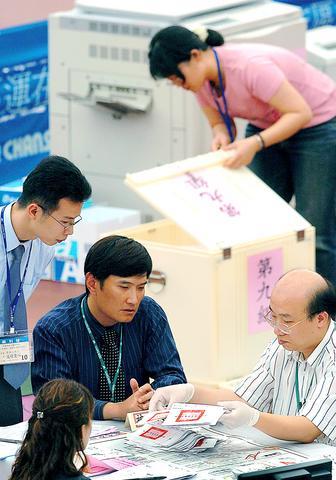Court officials began recounting ballots from the disputed presidential election yesterday, with no major disturbances reported.
State Public Prosecutor-General Lu Jen-fa (盧仁發) yesterday ordered all prosecutors' offices on high alert, telling them to be strict in handling any disturbances or legal violations that occur during the recount.

PHOTO: SEAN CHAO, TAIPEI TIMES
"We hope the public will remain rational and allow the recount to be conducted smoothly and peacefully," Lu said.
Twenty-one district courts and 463 judges took part in the recount yesterday.
Although the Taiwan High Court had stated earlier that district courts, which are in charge of the recount, would not make public daily progress in the recount, a number of controversial ballots and administrative blunders were reportedly found at various recount centers across the country by both political camps.
A PFP representative claimed that most invalid ballots found in Taipei City constituencies were intended for the pan-blue ticket of Chinese Nationalist Party (KMT) Chairman Lien Chan (
"During the recount process this morning, pan-blue lawyers reported that the number of invalid ballots intended for the Lien-Soong ticket were several times those for the ticket of [President] Chen Shui-bian (陳水扁) and [Vice President] Annette Lu (呂秀蓮)," PFP Legislator Chin Huei-chu (秦慧珠) said. "It is a shame that most of the ballots have a stamp on Lien's picture or on `No.2,' the candidate number of Lien."
When the validity of a ballot is called into question, a color photocopy of the ballot is presented to the Taiwan High Court for a final ruling. A copy of the ballot will be retained by lawyers of both camps as evidence.
The Taiwan High Court's "recount central command" is working with the district courts via phone, fax and the Internet.
The recounted ballots break down into three main categories: valid ballots for Chen-Lu, valid ballots for Lien-Soong, and invalid ballots.
At press time last night, both political camps were at odds over the number of controversial ballots discovered yesterday.
The Central Election Commission's (CEC) guidelines for validating ballots, made public by the commission before the March 20 election, are being used in the recount.
Ballots that do not conform to CEC guidelines will be presented to the High Court.
At the Taishan and Tucheng recount centers in Taipei County, 3,000 ballots were reported to be missing.
Panchiao was the largest constituency in the nation, with 1.7 million ballots cast in the election. Forty judges of the Panchiao District Court were assigned to recount duties, leaving only six judges to handle trials.
All recount centers are closely guarded by armed police and only recount personnel with special passes are allowed to enter.
Also See Stories:
Accept recount, DPP tells Lien
Ma and Wang say recount is only one of the blues' tactics
Lien will accept recount ... if it's `fair'

A Ministry of Foreign Affairs official yesterday said that a delegation that visited China for an APEC meeting did not receive any kind of treatment that downgraded Taiwan’s sovereignty. Department of International Organizations Director-General Jonathan Sun (孫儉元) said that he and a group of ministry officials visited Shenzhen, China, to attend the APEC Informal Senior Officials’ Meeting last month. The trip went “smoothly and safely” for all Taiwanese delegates, as the Chinese side arranged the trip in accordance with long-standing practices, Sun said at the ministry’s weekly briefing. The Taiwanese group did not encounter any political suppression, he said. Sun made the remarks when

The Taiwanese passport ranked 33rd in a global listing of passports by convenience this month, rising three places from last month’s ranking, but matching its position in January last year. The Henley Passport Index, an international ranking of passports by the number of designations its holder can travel to without a visa, showed that the Taiwan passport enables holders to travel to 139 countries and territories without a visa. Singapore’s passport was ranked the most powerful with visa-free access to 192 destinations out of 227, according to the index published on Tuesday by UK-based migration investment consultancy firm Henley and Partners. Japan’s and

BROAD AGREEMENT: The two are nearing a trade deal to reduce Taiwan’s tariff to 15% and a commitment for TSMC to build five more fabs, a ‘New York Times’ report said Taiwan and the US have reached a broad consensus on a trade deal, the Executive Yuan’s Office of Trade Negotiations said yesterday, after a report said that Washington is set to reduce Taiwan’s tariff rate to 15 percent. The New York Times on Monday reported that the two nations are nearing a trade deal to reduce Taiwan’s tariff rate to 15 percent and commit Taiwan Semiconductor Manufacturing Co (TSMC, 台積電) to building at least five more facilities in the US. “The agreement, which has been under negotiation for months, is being legally scrubbed and could be announced this month,” the paper said,

MIXED SOURCING: While Taiwan is expanding domestic production, it also sources munitions overseas, as some, like M855 rounds, are cheaper than locally made ones Taiwan and the US plan to jointly produce 155mm artillery shells, as the munition is in high demand due to the Ukraine-Russia war and should be useful in Taiwan’s self-defense, Armaments Bureau Director-General Lieutenant General Lin Wen-hsiang (林文祥) told lawmakers in Taipei yesterday. Lin was responding to questions about Taiwan’s partnership with allies in producing munitions at a meeting of the legislature’s Foreign Affairs and National Defense Committee. Given the intense demand for 155mm artillery shells in Ukraine’s defense against the Russian invasion, and in light of Taiwan’s own defensive needs, Taipei and Washington plan to jointly produce 155mm shells, said Lin,